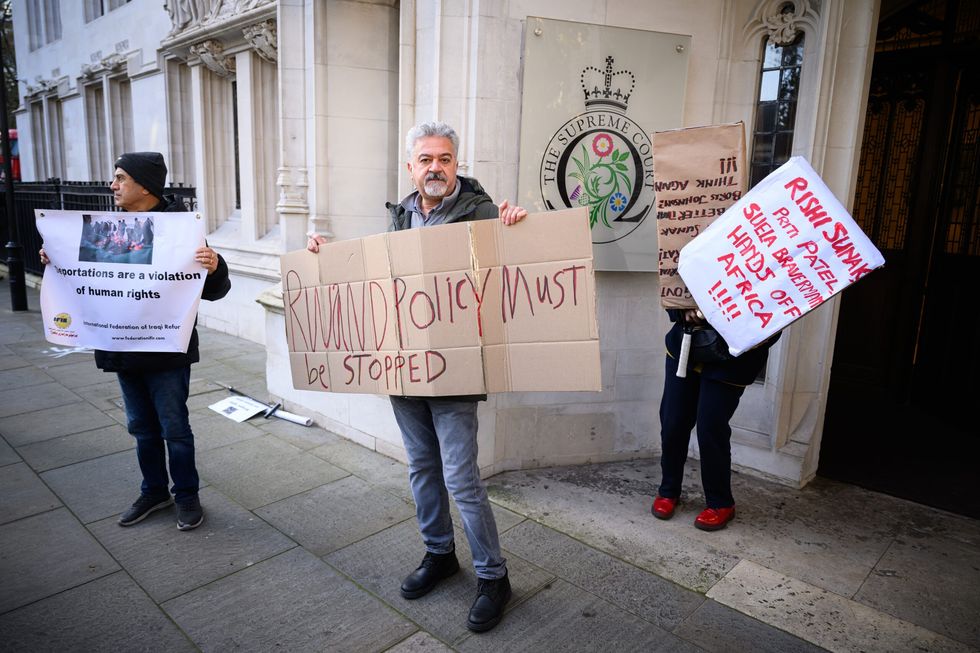HAVING survived the biggest Commons backbench rebellion of his premiership to date, Rishi Sunak made a pre-emptive strike on the upper house over his Rwanda Bill: “Will the opposition in the appointed House of Lords try and frustrate the will of the people as expressed by the elected House?”, he asked.
It takes chutzpah for an unelected Prime Minister to emulate the “peers against the people” battles of David Lloyd George over a century ago. If Sunak’s appointment as Prime Minister reflects our parliamentary system, so does the role of the Lords. Sunak has no proposals to reform, elect or abolish it. And “Get Rwanda Done” offers a weak echo of the Brexit arguments of 2019. There was no referendum on Rwanda, nor any hint of this policy in the Conservative 2019 manifesto. The new year polls show more public support for scrapping the policy than persisting with it.
Unimpressed by the press conference lecture, peers’ first move was to ensure sufficient time to scrutinise the bill, so the Lords will not return it to the Commons before mid-March. The Lords then recommended delaying ratifying the UK-Rwanda Treaty, until the Rwandan asylum reforms it promises have been implemented.
But there are different views over how far the Lords should go in trying to amend, delay or kill the bill. Those with legal expertise are most scathing. Tory peer Lord Garnier, former solicitor-general, compares it to a bill that declares all dogs are cats. Crossbencher Lord Carlile calls it a ‘step towards totalitarianism’. The Lib Dems propose a ‘fatal amendment’ to reject the Bill outright.
But Labour sources suggest only token resistance, conceding if the Commons rejects the Lords’ amendments. After all, Labour expects to be in government by next year, trying to get its own legislation through the Lords.

The government rejects the charge that the Bill undermines the rule of law. The official line is that it respects the Supreme Court verdict finding Rwanda unsafe but wants Parliament to recognise that its new Treaty has now fixed those problems. This sounds an unlikely story: if it was true, why would the government need its Rwanda Safety Bill to bar the UK courts from looking at the substance?
The Lords’ best option may be to take seriously the government’s ostensible commitment to ensure Rwanda is substantively safe, rather than just declaring it so. Former Justice Secretary Robert Buckland made a valiant attempt in the Commons debate to insist Rwanda must be deemed safe on the basis of ”facts on the ground”, not “legal fictions”.
Would anybody ever go to Rwanda if this bill passes? Sunak says he still hopes for flights this Spring. Yet even last week, government sources went from briefing the Sun that 100 asylum seekers could be flown to Rwanda “within hours” of the bill securing Royal Assent, to managing expectations by saying it would take another two or three months afterwards to operationalise the policy. It may be that no pre-election flights ever happen.
If the first Rwanda flight had not been stalled by an interim order of the Strasbourg Court, Britain would have sent asylum seekers to Africa unlawfully. The Safety of Rwanda Bill makes unlawful removals more likely – because MPs and peers are being asked to enable flights without legal oversight and without knowing what the final ECHR [European Court of Human Rights] judgment may say.
An amendment, insisting British courts must have as much of a role as the European Court under this Bill, would make unlawful removals to Rwanda much less likely.

A ’wedge issue’ in politics is supposed to unite your supporters but divide your opponents. As ingenious political traps go, the Rwanda plan has been in the spirit less of Machiavelli than of Wile E Coyote. Sunak is now lighting the fuse to set up a conflict with the European Court but the explosion may bring more self-inflicted damage – with either ministers resigning if the government wants to ignore an interim ruling, or a fierce media and political backlash if he backs down now.
Labour now sounds more confident about its plan to scrap the Rwanda scheme once it is in power, emphasising that Sunak must wish he had ditched it too. The opposition argument, that it was always an expensive, unworkable gimmick, will be stronger if the scheme never starts than if a symbolic flight makes it off the ground.
Yet the Opposition may still let a dangerously unamended Rwanda Safety Bill through. Rather than conceding too easily, Labour should use its voice and votes to support cross-benchers, ex-judges, Bishops and Conservative rebels who insist on constructive amendments that ensure Rwanda is genuinely safe – and be willing to delay the bill until that substantive change is negotiated.
Sunak’s “peers against the people” soundbites show how the Rwanda plan has become a form of pre-election political theatre. Those voting on the legislation need to own the real impacts on people’s lives too.





 Heehs describes two principal approaches to biographyAMG
Heehs describes two principal approaches to biographyAMG












 David Beckham wearing a David Austin Roses "King's Rose" speaks with King Charles III during a visit to the RHS Chelsea Flower Show at Royal Hospital Chelsea on May 20, 2025Getty Images
David Beckham wearing a David Austin Roses "King's Rose" speaks with King Charles III during a visit to the RHS Chelsea Flower Show at Royal Hospital Chelsea on May 20, 2025Getty Images
‘Rwanda soundbites cannot hide bill’s real-life impact’
Labour urged to back constructive amendments after Lords delay plan